
Russell Lee Proprietor of small store in market square, Waco, Texas 1939

Boomerang.
• MSNBC’s Non-Story: Trump Made $150 Million, Paid 25% Tax Rate (ZH)
While Rachel Maddow drones on with the coherence of Janet Yellen, losing thousands of viewers by the minute, the MSNBC anchor was promptly scooped not only by the White House which revealed her “secret” one hour in advance, but also by the Daily Beast which reported that its contributor David Cay Johnston had obtained the first two pages of Trump’s 2005 federal income tax return, allegedly receiving them in the mail, and posted his “analysts” on his website, DCReport.org. According to the documents, Trump and his wife Melania paid $38 million in total income tax, consisting of $5.3 million in regular federal income tax, and an additional $31 million of “alternative minimum tax,” or AMT.
The White House statement confirmed the finding: “Before being elected President, Mr. Trump was one of the most successful businessmen in the world with a responsibility to his company, his family and his employees to pay no more tax than legally required,” the White House said in a statement. “That being said, Mr. Trump paid $38 million dollars even after taking into account large scale depreciation for construction, on an income of more than $150 million dollars, as well as paying tens of millions of dollars in other taxes such as sales and excise taxes and employment taxes and this illegally published return proves just that.” As the Beast notes, 2005 was the year that Trump, then a newly minted reality star, made his last big score as a real-life real estate developer, when he sold two properties, one on Manhattan’s west side and one in San Francisco, to Hong Kong investors, accounting for the lion’s share of his income that year.
“It is totally illegal to steal and publish tax returns,” the White House statement concluded. “The dishonest media can continue to make this part of their agenda, while the President will focus on his, which includes tax reform that will benefit all Americans.” But the real story here is that there is no story: what MSNBC confirmed is that Trump made more money than some of his critics said he made in the period in question, and more importantly, that he paid a generous effective income tax rate, well above the 14.1% rate paid by Mitt Romney, and even higher than the 13.5% federal tax rate paid by Bernie Sanders in 2014.
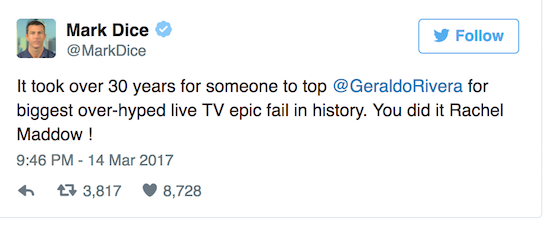

Three articles in a row that deal with decentralization, each from their own angle. Most important chart I don’t know, but a good indicator of the entire west moving away from traditional parties. The majority of votes may go to new parties, not established ones.
• The Most Important Chart To See Before The Dutch Election (Ed Harrison)
The present Prime Minister of the Netherlands, Mark Rutte, is the first Prime Minister from a party other than the two traditional centrist parties, the PvdA and the CDA, and their predecessor parties since the Dutch constitution and voting system was fundamentally changed in 1917. Clearly, we are seeing a change in voting patterns. But what is even more remarkable is that right now poling for parties that have always been in opposition is almost half of the vote for this election. Why it matters: We are in the midst of an economic upswing in Europe and globally as well. By all macro accounts, the Dutch economy is performing well. Yet, between them, previous ruling coalition parties —the VVD, PvdA, CDA, D66 and CU — are projected to only get 52% of the vote.
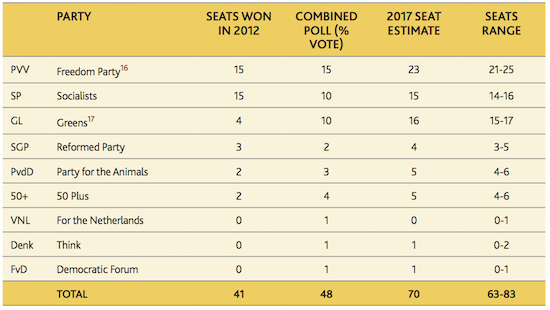
Source: Legatum Institute
They could even get fewer votes than the parties that have never been in government during the 100 years of the modern Dutch electoral system. People talk about voters turning to populists. But what happens to electoral patterns in a recession — or another sovereign debt crisis? And how would more populist platforms or parties in Europe deal with the existing economic orthodoxy, dominated by the stability and growth pact’s 3 and 60% deficit-debt hurdles? The next coalition in the Netherlands could be unstable, as it is likely to be cobbled together to exclude the PVV. Overall, the political risks in Europe may be high right now, but depending on how the economy does, the risks can rise further still.

As I’ve addressed many times. Centralization is in the past.
• Fragmentation Is the Solution, Not the Problem (CHS)
The fragmentation of political consensus (i.e. the consent of the citizenry) is presented by the Powers That Be and their media servants as being a disaster. The implicit fear is real enough: how can we rule the entire nation-empire if it fragments?\ As I noted the other day, fragmentation terrifies the Establishment of racketeers and insiders, for when the centrally-enforced rentier skims and scams collapse, those who own and control the rentier skims, scams and rackets will lose the source of their wealth and power. To understand why fragmentation is the solution rather than the problem, we have to look at how power is leveraged in centralized government. Let’s take the recent increase in a common pinworm treatment from $3 to $600: Pinworm prescription jumps from $3 to up to $600 a pill (via J.F.).
In a top-down, centralized hierarchy of political power (i.e. the central state), the pharmaceutical company only needs to lobby a few authorities in the central state to impose its rentier skim/scam on the entire nation. Lobbying/bribing a relative handful of federal officials and elected representatives is remarkably inexpensive: a financier or corporation only needs to focus on these few key players, and smoothing the PR pathway via a highly concentrated corporate media. A mere $5 million spent in the right places guarantees $100 million in future profits– profits earned not from open competition in a transparent market, but profits plundered as rentier skims: the product didn’t get any better or effective when the price leaped from $3 to $600, and competition was squelched by regulatory capture and high barriers to entry.
Now imagine if the pharmaceutical company had to lobby/bribe officials in each of America’s 3,142 counties to impose its rapacious rentier skim on the populace of each county. The lobbying/bribing effort will be orders of magnitude more costly and complex, and the national corporate media is less effective at the local level, where community groups and local media have some influence. If we look at the source of the 2008 Global Financial Meltdown, we find that the centralization of capital and power were the primary enablers of the meltdown. If the financial system were composed of 1,200 local banks, each of which had to comply with local and state regulations instead of five behemoth banks that had the capital and klout to buy Washington D.C.’s approval of their leverage and shady dealings, some hundreds of the smaller banks might have failed–but the system would have survived.
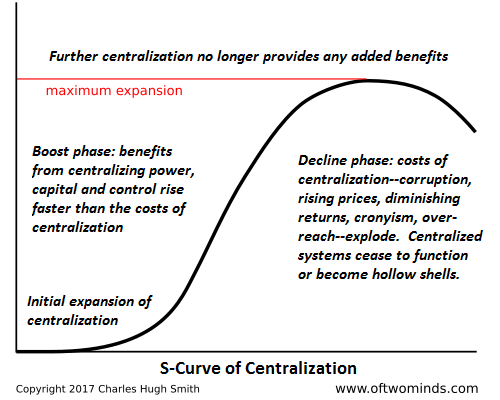

Sapir is interesting. But economics is still not a science. Also addresses decentralization.
• Economists Are Political Actors – Sapir (AHT)
[..] economists have appropriated a power that is not theirs. They have indeed penetrated the inner workings of the ruling apparatus. This is true at the State level, as to that of major international organizations, whether it is in the European Union, the OECD or the WTO. They are thus increasingly inclined to intervene on all social and political problems. But when they occur, it is by mixing an experts position and a position of political actors. This poses an immediate problem. For, if the expert is legitimate to speak on behalf of an acquaintance, the political actor must comply with the rule of democratic debate. By having it both ways, economists are exonerated from the problem of verification. The problem, therefore, is to know in which space one speaks, in that of pure competence or in that of political choices. If it is in the latter, it is no longer possible to accept that the “expertise” alone can decide the debate, expertise which can no longer be verified because any judgment would combine elements of competence and political values.
If one is in the political space, then the question of legitimacy arises. Now, this question immediately refers to the higher-level issue of sovereignty. In the space of politics, one asks first who is legitimate, and who is sovereign. But there is a problem that is deeper. The scientific credibility they claim to be is far from being indisputable, or undisputed. There are very serious reasons for this, which I explained in a book dating back to the early 2000s [1]. The very way in which the majority of the profession, the economists of the mainstream, understands the object of its work, is today debated and strongly criticized [2]. The methods used by these economists, the models on which they are based, are openly contested. [..] In fact, economists do politics, what nobody ever thinks to reproach them for, but they do politics by pretending not to do so, and by delegitimizing in advance any critical discourse. This is, of course, a serious attack on democracy.
[..] It is wrong here to speak of “Europe” as if it were an institution or a federation. The only reality of Europe is a historical reality, diverse, and above all a cultural reality. If you go to Vladivostok in Russia, you are in a European city. What is now a problem for democracy is the existence of the European Union, which is an institution and of which we can follow the evolution from the origin, that is to say the Maastricht Treaty. Indeed, the evolution of the European Union since 2007-2009 is a real problem. There, yes, unquestionably, we are in the presence of a structure that tends to develop itself without control or responsibility. The statements of Jean-Claude Juncker in the Greek election of January 2015 testify it [37].
The behavior of the EU and the institutions of the Euro zone call for an overall reaction because these institutions contest this freedom that is sovereignty [38]. Let us remind here the quotation from Mr. Jean-Claude Juncker, the successor of the ineffable Barroso at the head of the European Commission: “There can be no democratic choice against European treaties”. This revealing statement dates from the Greek election of January 25, 2015, which precisely saw the victory of SYRIZA. In a few words, everything is said. It is the quiet and satisfied affirmation of the superiority of non-elected institutions over the voting of voters, of the superiority of the technocratic principle over the democratic principle.

The mother of all asset bubbles.
• One Chart That Captures the Debate Over Quantitative Easing
Not all price increases are created equal. Goldman Sachs raises questions about the success of the efforts by the Federal Reserve and its peers to spark inflation in the wider economy with a chart showing what’s happened with prices in the largest developed economies since the start of 2009. A replication of their analysis shows a big spread in gains. While wages would never show swings on par with the likes of high-yield bonds, the chart does illustrate how well financial markets recovered from the 2007 to 2009 meltdowns. By contrast, consumer price inflation, incomes and other such gauges of the “real” economy have put in muted performances. For politicians, the chart sums up the frustrations that have helped propel the populism that Brexiteers and Donald Trump rode to victory.
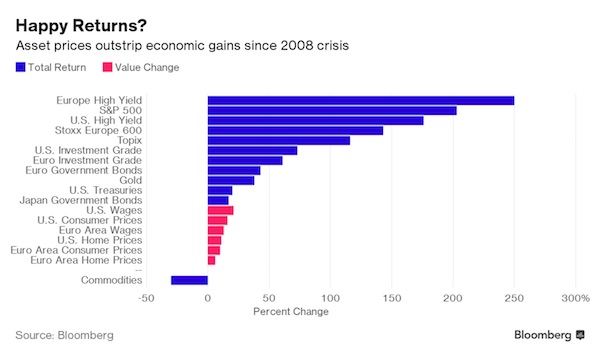
Few would question that the real economy would have been in much worse shape without the Fed, ECB and Bank of Japan’s determination to avert a financial-industry meltdown last decade, an effort that saw their balance sheets balloon by trillions of dollars. [..] Economic growth and wage increases have disappointed in recent years, depressed by poor productivity gains and historically low labor-force participation – dynamics that lie outside the purview of central banks. Now that monetary policy makers are leaving the onus on governments to address growth, and contemplating the easing off of stimulus, the big question for investors is how resilient markets will be. For now, optimism prevails – everything from corporate-bond premiums to emerging-market bonds are flashing confidence. It’s perhaps no wonder: though the Fed has ended its QE, continuing programs at the ECB and BOJ are driving almost $200 billion of purchases a month, according to Deutsche Bank estimates.

Yawn…
• Fed Expected To Raise Rates As US Economy Flexes Muscle (R.)
The Federal Reserve is expected to raise interest rates for the second time in three months on Wednesday, encouraged by strong monthly job gains and confidence that inflation is finally rising to its target. A rate hike at the conclusion of the Fed’s latest two-day policy meeting is already baked into bond yields and financial markets overall, with investors putting the likelihood of such a move at 95%, according to CME Group’s FedWatch program. Attention is turning instead to whether the U.S. central bank will signal an even faster pace of monetary tightening this year than the current three rate hikes that it projected at the December policy meeting.
“Expectations have some catching up to do regarding the Fed’s need to ‘lean into the wind’ of rising inflation, strong growth, robust sentiment, easy financial conditions, and the likelihood of fiscal stimulus in 2018,” analysts from Goldman Sachs wrote ahead of the meeting. They said they regarded a fourth rate increase this year as a “close call.” A rate increase on Wednesday would push the Fed’s target overnight lending rate to a range of between 0.75% and 1.00%, still low but approaching the range that the central bank has typically operated within. The Fed is scheduled to release its latest policy statement along with updated economic forecasts at 2 p.m. EDT. Fed Chair Janet Yellen is due to hold a press conference half an hour later.

“Will my family and I truly be better off by going it alone? Will we really be more safe and secure?”
• Britain Is Politically Dead From The Neck Down (Monbiot)
Here is the question the people of Scotland will face in the next independence referendum: when England falls out of the boat like a block of concrete, do you want your foot tied to it? It would be foolish to deny that there are risks in leaving the United Kingdom. Scotland’s economy is weak, not least because it has failed to wean itself off North Sea oil. There are major questions, not yet resolved, about the currency it would use; its trading relationship with the rump of the UK; and its association with the European Union, which it’s likely to try to rejoin. But the risks of staying are as great or greater. Ministers are already trying to reconcile us to the possibility of falling out of the EU without a deal.
If this happens, Britain would be the only one of the G20 nations without special access to EU trade – “a very destructive outcome leading to mutually assured damage for the EU and the UK”, according to the Commons foreign affairs committee. As the government has a weak hand, an obsession with past glories and an apparent yearning for a heroic gesture of self-destruction, this is not an unlikely result. On the eve of the first independence referendum, in September 2014, David Cameron exhorted the people of Scotland to ask themselves: “Will my family and I truly be better off by going it alone? Will we really be more safe and secure?” Thanks to his machinations, the probable answer is now: yes.
In admonishing Scotland for seeking to protect itself from this chaos, the government applies a simple rule: whatever you say about Britain’s relationship with Europe, say the opposite about Scotland’s relationship with Britain. In her speech to the Scottish Conservatives’ spring conference, Theresa May observed that “one of the driving forces behind the union’s creation was the remorseless logic that greater economic strength and security come from being united”. She was talking about the UK, but the same remorseless logic applies to the EU. In this case, however, she believes that our strength and security will be enhanced by leaving. “Politics is not a game, and government is not a platform from which to pursue constitutional obsessions,” she stormed – to which you can only assent.

“And the last of the paradoxes is that Turkish electoral law prohibits pre-election rallies abroad..”
What Turkish President Recep Tayyip Erdogan is trying to accomplish is perfectly clear: He wants to win the April 16 referendum on constitutional reform and thus gain the enhanced powers his ambitious nature so covets, some of which he already enjoys after turning last summer’s failed coup into an opportunity. His strategy is also clear: criminalizing any opposition, be it in actions or mere words, mainly at the expense of journalists and the Kurds, as well as condemning in summary fashion anyone perceived as being pro-Gulen. The second part of his strategy involves exporting his edginess and bullying rhetoric, first and foremost to the Aegean at the expense of Greece, and then to the European Union in a bid to win favor among Gray Wolves voters.
The Turkish president is also trying to strong-arm Western Europe into recognizing his prerogative (and that of his subordinates, though only those who vote his way next month) to a right that he himself openly scorns and denies his opponents. History is full of such paradoxes. Another is that while Erdogan accuses the West of Islamophobia, he is doing everything in his power to strengthen this sentiment because it will benefit him at the polls, as for years he has been cultivating the myth that he is the leader of all of Islam, both in the East and the West. In contrast to Erdogan, what the EU is trying to achieve vis-a-vis Ankara is not so clear, neither in terms of strategy nor even in tactics. Overall, it’s hard to know what it’s thinking about Turkey’s “European prospects” and, more specifically right now, about the pre-election speeches of Turkish pro-Erdogan officials in EU member-states.
Pre-election anxiety strengthened by the rising popularity of anti-systemic, anti-migrant, far-right forces, has been instrumental in Europe as well, especially in the Netherlands and Germany. It has resulted in bans against Turkish officials that demonstrate fear rather than faith in the strength of democracy, even when it is exposed to the test of regimes which are hardly democratic, such as Turkey. Meanwhile, fears that the European Union’s refugee deal with Turkey may collapse have prevented the German and Dutch leaderships from openly condemning the human rights violations in Turkey, resulting in them basically swallowing profound insults from Erdogan and some of his ministers referring to fascists and Nazis. Here’s another paradox: Turkey, which didn’t exactly shine in the war against Nazism, condemning the Netherlands, a victim of Nazism.
And the last of the paradoxes is that Turkish electoral law prohibits pre-election rallies abroad.

I’d be interested to see a study like this done for bats. They eat a lot of insects. And there are lots of them: 1/3 of all mammals is a bat I recall reading.
• World’s Spiders Eat More “Meat” Than All Of Mankind (G.)
The world’s spiders eat 400-800m tonnes of insects every year – as much meat and fish as humans consume over the same period, a study said Tuesday. In the first analysis of its kind, researchers used data from 65 previous studies to estimate that a total of 25m metric tonnes of spiders exist on Earth. Taking into account how much food spiders need to survive, the team then calculated the eight-legged creatures’ annual haul of insects and other invertebrates. “Our estimates … suggest that the annual prey kill of the global spider community is in the range of 400-800m metric tons,” they wrote in the journal The Science of Nature. This showed just how big a role spiders play in keeping pests and disease-carriers at bay – especially in forests and grasslands where most of them live.
“We hope that these estimates and their significant magnitude raise public awareness and increase the level of appreciation for the important global role of spiders,” the study authors wrote. For context, the study points out that humans consume about 400m tonnes of meat and fish every year, while whales feed on 280-500 tonnes and seabirds about 70m tonnes of seafood. There are about 45,000 known spider species, all of them meat-eating. And the critters can travel far to feed, swinging from place to place on silken threads that allow them to cover up to 30km (19 miles) in a day. Spiders are found everywhere from the Arctic to the most arid of deserts, in caves, on ocean shores, sand dunes and flood plains, the study authors said.
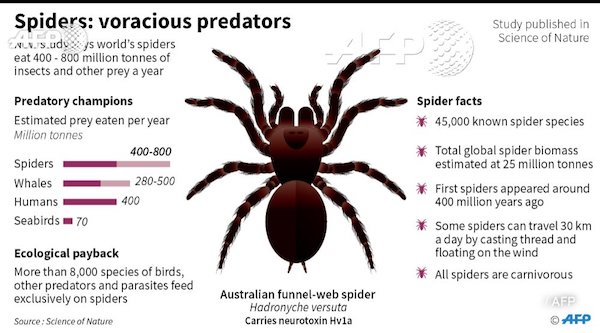

Unbelievable.
• Monsanto Accused of Ghostwriting Papers on Roundup Cancer Risk (BBG)
Monsanto was accused in court documents of ghostwriting scientific literature that led a U.S. regulator to conclude a key chemical in its Roundup weed killer shouldn’t be classified as carcinogenic. Lawyers suing the company on behalf of farmers and others, who claim exposure to glyphosate caused their non-Hodgkin’s lymphoma, alleged in a court filing which was partially blacked out until Tuesday that the Environmental Protection Agency “may be unaware of Monsanto’s deceptive authorship practice.” The filing was made public by a federal judge in San Francisco handling the litigation. The judge said last month he’s inclined to require a retired EPA official to submit to questioning by plaintiffs’ lawyers who contend he had a “highly suspicious” relationship with Monsanto.
The former official oversaw a committee that found insufficient evidence to conclude glyphosate causes cancer and left his job last year after his report was leaked to the press. The plaintiff lawyers said in the filing that Monsanto’s toxicology manager and his boss were ghost writers for two of the reports, including one from 2000, that the EPA committee relied on to reach its conclusion. Among the documents unsealed Tuesday was a February 2015 internal e-mail exchange at the company about how to contain costs for a research paper. The plaintiff lawyers cited it to support their claim that the EPA report is unreliable, unlike a report by an international agency that classified glyphosate as a probable carcinogen.
“A less expensive/more palatable approach” is to rely on experts only for some areas of contention, while “we ghost-write the Exposure Tox & Genetox sections,” one Monsanto employee wrote to another. The names of outside scientists could be listed on the publication, “but we would be keeping the cost down by us doing the writing and they would just edit & sign their names so to speak,” according to the e-mail, which goes to on say that’s how Monsanto handled the 2000 study.

And this is even more unbelievable. After 25 years of Roundup being on the market, not one cancer study has been done.
• Monsanto Colluded With EPA, Could Not Prove Roundup Doesn’t Cause Cancer (ZH)
newly unsealed court documents released earlier today seemingly reveal a startling effort on the part of both Monsanto and the EPA to work in concert to kill and/or discredit independent, albeit inconvenient, cancer research conducted by the World Health Organization’s International Agency for Research on Cancer (IARC)….more on this later. But, before we get into the competing studies, here is a brief look at the ‘extensive’ work that Monsanto and the EPA did prior to originally declaring Roundup safe for use (hint: not much). As the excerpt below reveals, the EPA effectively declared Roundup safe for use without even conducting tests on the actual formulation, but instead relying on industry research on just one of the product’s active ingredients.
“EPA’s minimal standards do not require human health data submissions related to the formulated product – here, Roundup. Instead, EPA regulations require only studies and data that relate to the active ingredient, which in the case of Roundup is glyphosate. As a result, the body of scientific literature EPA has reviewed is not only primarily provided by the industry, but it also only considers one part of the chemical ingredients that make up Roundup.” Meanwhile, if that’s not enough for you, Donna Farmer, Monsanto’s lead toxicologist, even admitted in her deposition that she “cannot say that Roundup does not cause cancer” because “[w]e [Monsanto] have not done the carcinogenicity studies with Roundup.”
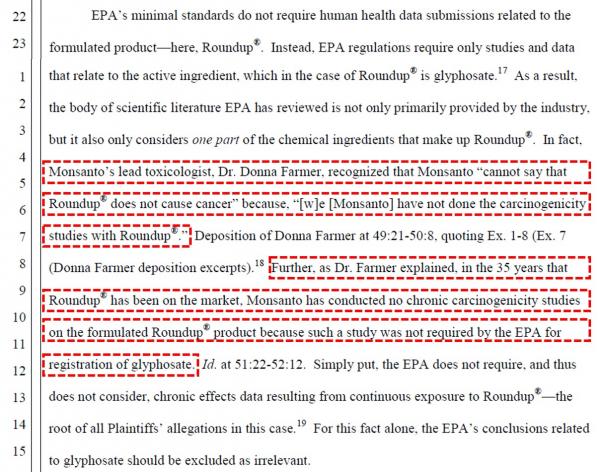
[..] In early 2015, once it became clear that the World Health Organization’s IARC was working on their own independent study of Roundup, Monsanto immediately launched their own efforts to preemptively discredit any results that might be deemed ‘inconvenient’. That said, Monsanto, the $60 billion behemoth, couldn’t possibly afford the $250,000 bill that would come with conducting a legitimate scientific study led by accredited scientists. Instead, they decided to “ghost-write” key sections of their report themselves and plotted to then have the independent scientists just “sign their names so to speak.”
Finally, when all else fails, you call in those “special favors” in Washington D.C. that you’ve paid handsomely for over the years. And that’s where Jess Rowland, the EPA’s Deputy Division Director for the Office of Chemical Safety and Pollution Prevention and chair of the Agency’s Cancer Assessment Review Committee, comes in to assure you that he’s fully exploiting his role as the “chair of the CARC” to kill any potentially damaging research…”if I can kill this I should get a medal.”
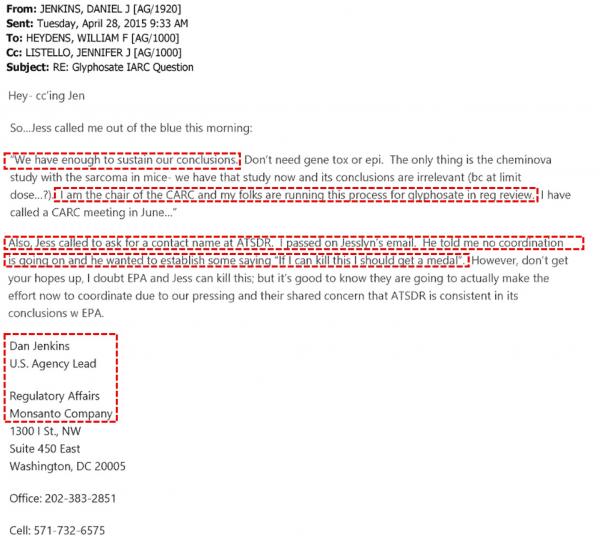

Even HRW has moved to using the politically correct ‘asylum seekers’. for refugees.
• Greece: A Year of Suffering for Asylum Seekers (HRW)
The EU-Turkey deal has trapped thousands of people in abysmal conditions on the Greek islands for the past year, while denying most access to asylum procedures and refugee protection, Human Rights Watch said today. This assessment of conditions is released ahead of the first anniversary of the agreement, signed on March 18, 2016. To carry out the deal, the Greek government has adopted a containment policy, keeping asylum seekers confined to the islands, including in the so-called refugee hotspots and other reception facilities, to facilitate speedy processing and return to Turkey. But continued arrivals, the mismanagement of aid funding, and the slow pace of decision-making, as well as the positive decisions of Greek appeals committees rejecting summary returns to Turkey as unsafe, have led to overcrowded and abysmal conditions on the Greek islands.
These factors, combined with the Greek authorities’ failure to properly identify vulnerable asylum seekers for transfer to the mainland, have resulted in deteriorating security conditions, unnecessary suffering, and despair. “The EU-Turkey deal has been an unmitigated disaster for the very people it is supposed to protect – the asylum seekers trapped in appalling conditions on Greek islands,” said Eva Cossé, Greece researcher at Human Rights Watch. “Greek authorities should ensure that people landing on Greece’s shores have meaningful access to asylum and put an end to the containment policy for asylum seekers. The deal’s flawed assumption that Turkey is a safe country for asylum seekers would allow Greece to transfer them back to Turkey without considering the merits of their asylum claims.
But in the months after the deal was completed, Greek asylum appeals committees have rightly ruled in many instances that Turkey does not provide effective protection for refugees and that asylum applications should be admitted for regular examination on their merits in Greece. Following EU pressure, however, Athens changed the composition of the appeals committees in June, and the restructured committees have ruled in at least 20 cases that Turkey was a safe country, even though it excludes non-Europeans from its refugee protection. That finding was challenged by two Syrian asylum seekers at Greece’s highest court, the Council of State, which heard their case on March 10. No one has yet been forcibly returned to Turkey on the grounds that their asylum application was inadmissible because they could obtain effective protection in Turkey. But if the Council of State turns down the appeal, it could pave the way for mass returns of asylum seekers to Turkey.

Boy, the sadness…
• As Greek Crisis Grinds On, Children Pay Price (K.)
In Greece’s grinding economic crisis, a home for abused children is now taking in those whose parents are struggling to feed them. It is perhaps the darkest sign of economic devastation in Greece, where traditionally strong family ties are starting to crumble after years of depression. A quarter of Greece’s workforce is unemployed and a quarter of its children live in poverty, according to United Nations figures, forcing parents to depend on grandparents for handouts. But pensions too have been cut a dozen times. In Athens, the Model National Nursery, set up a century ago for orphans of war, can hardly keep up with the number of parents turning to it for help. Unable to cover their basic needs, parents leave their children in the home all week.
Iro Zervaki, its head, says at least 40 children are on the waiting list, four times as many as a couple of years ago. The home sleeps 25 in a bare room with rows of beds draped in blue blankets, and lacks the staff and funds to increase capacity, she said. Most places are for abused children. Dozens of other children, all aged two to five, come in daily, but the days away from their parents are long. “We had incidents where children even attempted to leave, to run away, to go to their mother,” Zervaki said. In the buzzing playground, a little girl tugged the social worker’s blouse and yelled: “Miss! When will I go to my mum?” “They can’t tell the days apart so every day they ask: ‘Is it Friday?’” Anthoula Zarmakoupi, the social worker, said. “They know mum will pick them up at the weekend.”

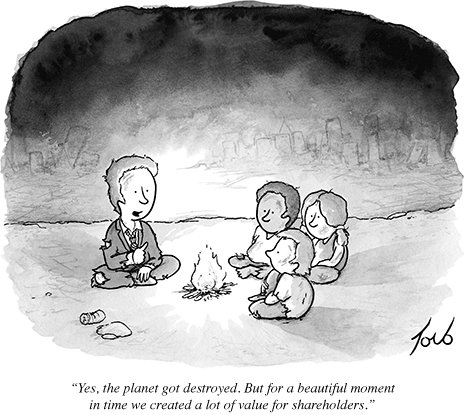









Home › Forums › Debt Rattle Ides of March 2017